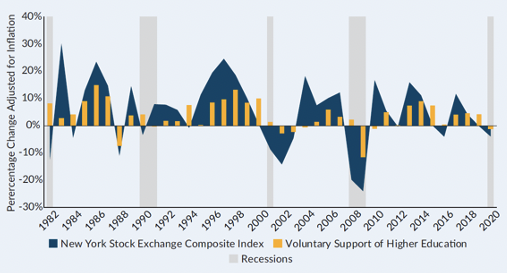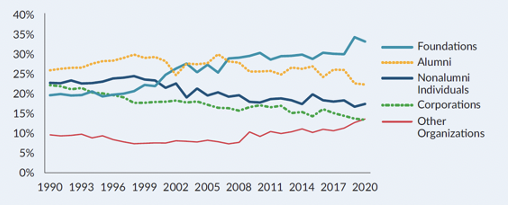Can alumni save the American university from the illiberal progressive onslaught? A piece in the Wall Street Journal reports that the country’s alumni are increasingly organising to ‘defund’ their alma maters until they get their free speech houses in order. At Washington and Lee University, an alumni group sent over 10,000 emails to alumni calling on them to suspend donations until the university stopped disassociating itself from its namesakes George Washington and Robert E. Lee.
Twenty new organisations have been formed in the past few years and a new national donor organisation, the Alumni Free Speech Alliance, sprang up in October. This new activism is important: witness the way donor pressure prevented Cecil Rhodes’s statue from being removed from Oriel College, Oxford. But alumni pressure, while valuable, is unlikely to change the direction of travel on campus.
According to Pew, the share of Republicans who say universities have a positive effect on the country fell from 57% in 2015 to 34% in 2021. Donors who populate the new free speech alumni associations tend to be conservative or moderate. They resent giving to universities that prioritise cultural progressivism over free speech, rationality and American nationhood.
Growing attention to culture war issues such as Cancel Culture and Critical Race Theory may be helping to galvanise donor action. ‘This is a battle for our culture and, in many ways, for Western civilization,’ said John Craig, leader of a group from Davidson College, North Carolina. Davidson commissioned a survey which went out to over 1100 donors. Of the 314 that responded, just 20% agreed ‘it is very or extremely clear the school administration protects free speech,’ while 94% said ‘the next president should make protecting free speech and civil discourse a priority.’ This indicates an impressive pool of potential support for the new initiatives.
Yet despite this, there is no sign that the absolute value of alumni contributions to American universities has fallen — even though alumni contributions form a declining share of universities’ total income. Instead, national records show that donations remain static, fluctuating with the economic cycle, as figure 1 shows. Many donors are older and are thus less personally exposed to cancel culture. Status considerations and residual loyalties appear to be more durable than worries about academic freedom or national traditions.

In addition, figure 2 shows that universities are growing more independent of alumni as overwhelmingly Left-leaning foundations such as Ford or Rockefeller have increased their contributions. Moreover, the political profile of elite donors has shifted substantially Leftwards over time. Big business used to give most of their money to the Republicans, but this is no longer the case.
As professions shift Left and the culturally Left-leaning tech sector has become more economically important, big donors are favouring the Democrats. In 2016, Donald Trump raised 70% of his campaign funds from donations of less than $200 compared to just 26% for Hillary Clinton. As if to illustrate this new elite progressivism, a young tech entrepreneur, Husayn Kassai, offered Oriel College to make up any shortfall in donor funding should it decide to remove Rhodes’ statue.
As figure 2 shows, alumni money is important, but has declined as a share of US universities’ takings, from close to 30% of voluntary contributions in 2006 to 22% in 2020. Meanwhile, foundations, who largely support the Equity, Diversity and Inclusion (EDI) agenda, have been rising in clout.

Conservative and classical liberal donors will need to get more organised and convince a larger share of their associates to withhold their cash if they are to dent the rising force of woke culture in universities. More broadly, government-led reforms like Britain’s Higher Education Freedom Bill alongside new free speech universities like the University of Austin, Ralston College or Britain’s University of Buckingham will be more important in restoring academic freedom to our illiberal campuses.








Join the discussion
Join like minded readers that support our journalism by becoming a paid subscriber
To join the discussion in the comments, become a paid subscriber.
Join like minded readers that support our journalism, read unlimited articles and enjoy other subscriber-only benefits.
SubscribeAstounding that foundations set up by the kings of capitalism have become left-leaning. I dread the future (if I’m still here) as the capture of institutions seems so absolute.
Do you not understand the Global Elite are out to conquer the world to a new Feudalism? Just look at covid – $10 Trillion ended up in the pockets of the wealthy, they grew Vastly more rich – AND at the same time they set up the world for the greatest Depression coming soon – likely much eclipsing the 1929 one, so that all are dependent on the Government, and so all are owned – as They own the Government.
The WEF, Davos, IMF – the Soros, Zuckerberg, and the many families hiding in the dark who pull the world’s strings of power. They are making their move, covid was the disaster they could not let go to waste. And their useful Idiots have been in place, growing in power; the Left Postmodernist Neo-Marxists who run the education system, the Left Political Parties, are making and hammering on the chains of servitude to all who rise up in their sick education system,.
Every year or few, in the end century of Rome, some man would rise up in the Army or Senate, rally armies to fight any comers, make himself Emperor – and soon die violently – AND more were lined up to have the next go for the crown…..
This is the lust for power the Psychopaths who become super wealthy lust for. Once as rich as Croesus the money is nothing – they seek Power. This is mankind through out History. This is mankind now. The Elites are tearing things apart for the Great Reset, to Build Back Better – but it is not for you – but for them.
With tongue firmly in cheek:
The west has exported capitalism to the east, where it seems to be improving lives slowly. Meanwhile the west has got bored with capitalism and wants to play at a form of socialism.
Relatively speaking, the west will get poorer and the east richer. In the next cycle, refugees from the west will travel to the east to improve their lives. The only ‘danger’ here is equalisation across the globe. Equalisation means that we get poorer.
Excellent comment. The West is collapsing while China looks on rubbing its hands in glee.
Much of what’s happening in the West is being paid for by non-Western interest groups.
Can you be specific?
Certainly Han China, let alone Japan or Korea, will not allow their societies to be polluted by mass immigration from the West or anywhere else. Their attachment to purity of culture and blood would forbid it. The distopia you describe would more likely involve servitude to Chinese companies in the West.
Western civilisation could never have been established without a fight. Now the activists want to clean up the product and give it a shine. They are a bit snotty about how their scratch-free cars look. They want all the right bumper stickers on them, too. The correct ones, meaning. All mod cons, too. But moderate conservatives will be trampled over, ultimately, ha!
Ultimately, the civilisation that has given today’s activists-for-change, activists-for-rupture, the optimistic victimised, the chance to do a quick-and-easy makeover in terms of appearing both well-off, well-fed and -clothed AND virtuous AS WELL AS owing nobody or anything nuthin’, has been Western Civilisation.